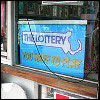Session Overview

|
Up until now, our analysis of consumers and firms alike has assumed that both have perfect knowledge of the future. However, the world is filled with uncertainty. We don’t know if it will rain tomorrow, if the stock market will go up next year, or if a new business will succeed or fail. This lecture analyzes the implications of uncertainty for consumer decisions. The economics of uncertainty impacts our decision to play the lottery. Image courtesy of Tom Morris on Flickr. |
Keywords: Expected utility theory; risk aversion; expected value; gambling.
Session Activities
Readings
Before watching the lecture video, read the course textbook for an introduction to the material covered in this session:
- [Perloff] Chapter 17, “Uncertainty.” (optional)
Lecture Videos
Resources
Check Yourself
Concept Quiz
This concept quiz covers key vocabulary terms and also tests your intuitive understanding of the material covered in this session. Complete this quiz before moving on to the next session to make sure you understand the concepts required to solve the mathematical and graphical problems that are the basis of this course.
Question 1
Some individuals, when facing a lottery or other situation of uncertainty, prefer not to accept gambles that are better than fair (i.e., have a positive expected return), because of the negative utility they receive from uncertainty. What is the name for this behavior?
The correct answer is risk aversion. A risk averse individual will not enter into even gambles with positive expected value because she or he receives negative utility from uncertainty; in fact, a risk averse individual will pay to avoid gambles.
Question 2
A person who is risk-loving by definition has a utility function with what shape?
A person who is risk-loving has a utility function that is convex. A person who is risk-neutral has linear utility, and a person who is risk-averse has a utility function that is concave.
Question 3
In general, what is true of people's risk aversion for changes in income that are marginal (i.e., very small changes in income)?
In general, people are less risk averse for very small changes in their income. They may experience some disutility from the uncertainty of potentially losing a dollar, but not much. Accordingly, they are more willing to accept a bet with the possibility of a loss for a very small amount of money.
Question 4
If a person is risk averse, he will pay a price for insurance even if the expected value of the insurance is lower than the price. Assume that the price of insurance is p, and the expected value (i.e., the expected payouts under the policy) is v. What is the term for the quantity p-v?
The correct answer is risk premium. Risk-averse people will buy insurance, because they are willing to pay money to avoid even the possibility of realizing an extremely low level of insurance. This extra money paid for insurance is known as the risk premium.










